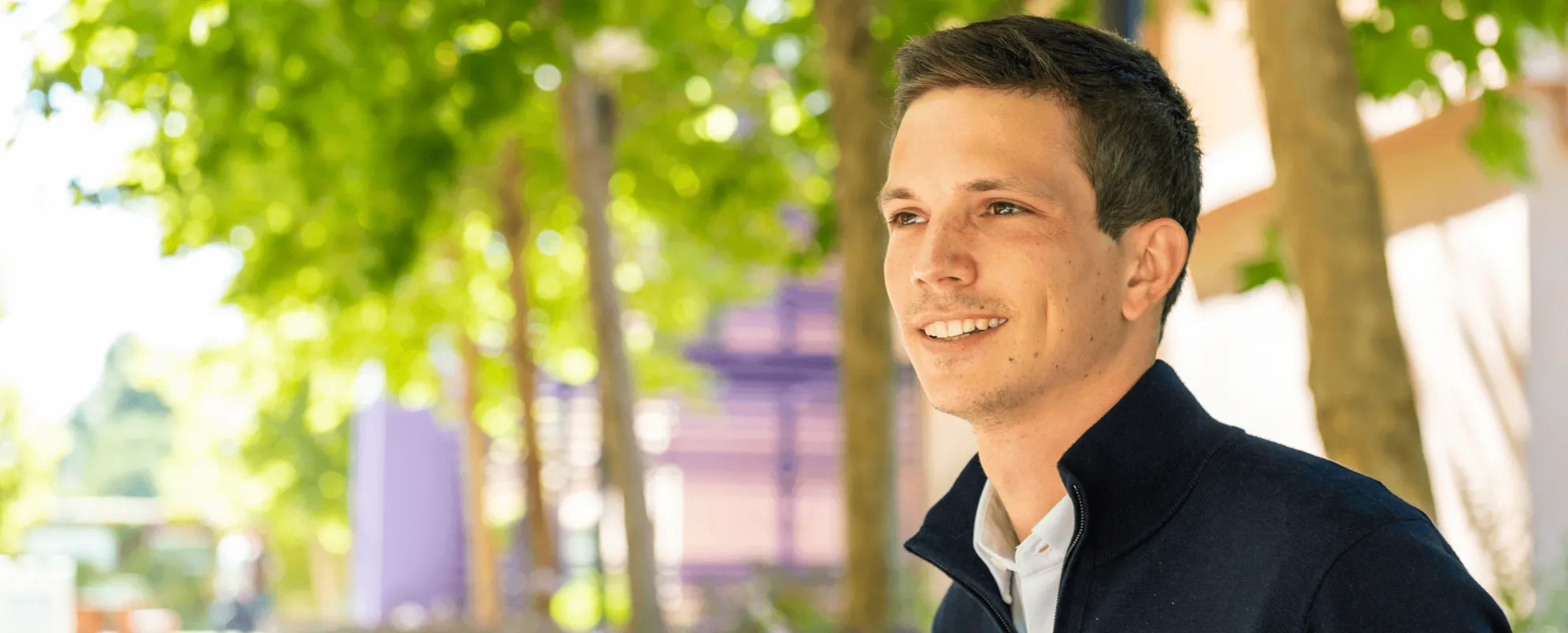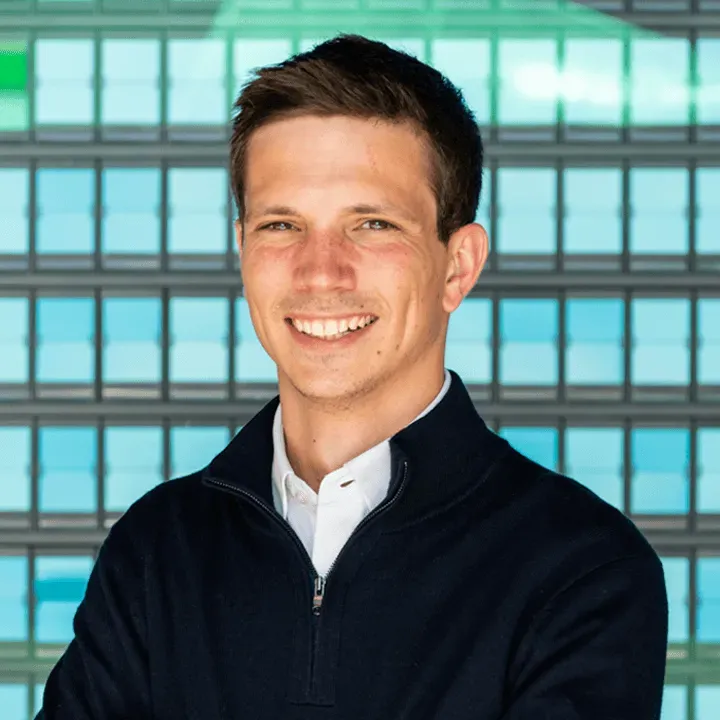Christopher Stromeyer says he does some of his best thinking while working among the gauchos who herd cattle on his grandmother’s ranch in rural Argentina. They taught him to recognize the importance of effective government in achieving social justice.
“That’s where I learned to understand what the people who are working hardest in our societies think, feel, and want,” says Stromeyer, who was born in Redwood City, CA but lived mostly abroad.
Stromeyer, who is also a German citizen, grew up splitting time between Argentina, various countries in Europe, and the United States. But he has adopted Argentina as his home, and it is that country’s future he hopes to make the focus of his career, including as a government leader.
An Arbuckle Fellow, a Knight-Hennessy Scholar and a View From The Top leader at Stanford GSB, Stromeyer acknowledges his “incredibly privileged upbringing,” which informs his commitment to help Argentina and its people unlock their potential. And his actions match his words. After working at Bain and Company, Stromeyer spent years in public service roles for the province of Buenos Aires. Now equipped with an MBA, he hopes to one day be part of an Argentinian government that delivers on its promises and restores trust with the country’s people. “Are we in government working toward that goal, or just in some ivory tower thinking about the world’s problems?”
You’ve said Argentina and its future are what matter most to you. Why?
I always struggled with the question, “Where are you from?” But when I think about the most important years of my childhood, it was my six years in Argentina. That’s where I wanted to be. After leaving at age 11, I never stopped reading the newspapers and being obsessed with that country. It became more a question, “Where do I want to be from?” I realize my values are most aligned with Argentina, or better, that country’s values are what bring out my most authentic self.
Why is the time you’ve spent helping your grandmother manage her cattle ranch so meaningful to you, and what lessons did you learn along the way?
It’s meaningful because it’s the one place in my life that hasn’t changed. That’s why it feels so like home. My grandmother is 90 years old now, and still ranching. I’m very close to the workers there. They’re spending all day herding cattle. When you’re on horseback for four or five hours a day, working together, you build deep connections and realize the passions we all share. I fully relax and focus on what’s important, and the people are a huge part of it.
One of the workers on the ranch, who’s also a good friend of yours, broke his back in a horse-riding accident and was paralyzed from the waist down. How did that incident and the aftermath affect your views on social justice?
I go on horseback with the men; we do the same work and there’s so much that connects us. But the opportunities I’ve had in my life are so much larger because of the circumstances of my birth. I could have fallen off that horse just as well as him. We tried to get him the best care and were told that if we got him help within the first 12 to 18 hours, there was a good chance he could regain his mobility. But he had to be treated in the public health system, and it took six or seven days for him to be operated on. If it had happened to me, I would probably have been flown immediately to a best-in-class care facility. The huge global disparities in wealth create imbalances that define our fate. Those gaps in access to safety nets and opportunities prevent certain segments of the population from living their full potential.
You clearly have a deep faith and commitment in the potential of government to address that.
What’s beautiful about government is that it’s an institution chosen by the people to represent everyone — who to benefit and what trade-offs to make for society’s future. It’s the biggest impact one can have. In Argentina, there is no trust from people in their government — the social contract between the two is broken. Without this trust it is near impossible for a society to become more prosperous and fairer.
You’re already a U.S. and German citizen and hope one day to be an Argentine citizen as well. Does that mean you’re optimistic about Argentina’s future?
Yes, very. Always. The human richness in Argentina is spectacular. It punches way above its weight in the academic world, in the scientific world, in the business world. The creativity in that society is unparalleled. But it’s stuck in this negative spiral. The country hasn’t grown in 10 years now, and the window gets smaller every year to make changes. It’s an incredibly hard situation to solve. But I just trust the people — their optimism, their will to live and their entrepreneurial creativity.
What role does private industry play in your worldview?
A critical role. My value-add in government was what I learned in my years at Bain. The private sector has so much to teach us about innovation and management. If we can apply best practices from the private sector to government, we can build a government that better serves its people. In Argentina, there are incentives in the private sector that society needs more of. In the end, policy is about shaping and responding to incentives, and no one understands incentives better than the private sector.
What was the hardest part about leaving a comfortable position at Bain to return to Argentina and enter government service?
At a place like Bain, you’re surrounded by experts in their fields all the time. It’s a best-practice machine that’s constantly evolving and innovating. In government, every time a new political party comes into power, the traditional approach is to throw away everything that was done, and so much gets lost. Every government wants to distance itself from its predecessor, but it also means you must constantly reinvent the wheel, which makes lasting progress challenging. On top of this governments are — no surprise — particularly prone to organizational politics, which means that any change takes longer and is harder to implement.
You focused your government work in Argentina on fundamentals: honest policing, quality public hospitals, and schools — priorities of the provincial governor you worked for. Would you have set those same priorities if you were in charge?
I would have set the exact same priorities. What I admired about Maria Eugenia Vidal was that she was focused on the big issues where government can make a difference. This is a province of 17 million people (40% of Argentina’s population). Even incremental improvements on public services can have a huge impact on people’s lives. The quality of the healthcare they get. Whether they feel safe in their homes. The education of their kids. We were laser-focused on those fundamental public services. We believed that rebuilding those services was the necessary condition to rebuilding citizens’ trust in our government — to rebuilding our social contract.
But then voters rejected all that at the polls.
Losing the election was a humbling lesson. We spent a ton of time listening to our constituents to understand their wants and needs but when we made budgetary decisions, we proudly prioritized the long-term over the short-term populist fixes so common to past governments. I now wonder if we moved too fast — if we anchored too much on society’s future aspirations (great schools, quality health care, safe roads) and not enough on their present everyday needs during a recession. In other words, if we failed to bring society along with our reforms.
How do you think a Stanford MBA will help you help the government there?
We need a competent government in order to rebuild the social contract. The government needs to be able to deliver on what it is elected for: to effectively deliver basic public services. For this, private sector innovation, a deep understanding on how to shape incentives, and best-in-class management are critical. That’s what I focused on at the GSB.
In your admissions essay, you questioned your own leadership abilities. What’s the most valuable lesson you’ve learned at the GSB that will help you address those questions?
Stanford has taught me that to truly connect with others and build lasting trust I needed to develop deeper levels of empathy. This begins with valuing my own emotions more. Through my experience with Interpersonal Dynamics, the Arbuckle Program and being around such an introspective group of peers, I now believe I’m in a place where I bring my best authentic self on a much more consistent basis. To me it’s much more than just a leadership ability — it’s a skill for life.
Learn anything from horseback riding that will serve you well while dealing with the complexities of government service?
On horseback I learn to slow down and connect with the here and now — something I often struggle with. There’s no cell signal and you’re surrounded by nature. That’s when I do my best thinking. Some of the best realizations I’ve had about how I want to impact the world come in those moments.
Photos by Kiefer Hickman


